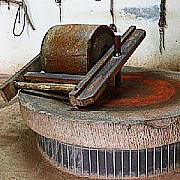Andy_S wrote:But to insist that theatricality was the primary purpose of most/all TCMA is nonsensical. We know enough about the masters of even the most flowery and least practical of TCMA, Taijiquan, to know that there were hardcore badasses in the lineages: warriors, escorts, bodyguards, fighters.
You see, I think this is the point where Scott's theory gets misunderstood and people get all upset with him and we had what we had last time - YOU HAVE INSULTED MY SHAOLIN TEMPLE WITH YOUR LUDICROUS SUGGESTION THAT MY FOREBARES WERE DANCERS AND YOU ARE BANNED!

But he's not saying anything is just one thing - rather that many things are intertwined together. In the words of the man himself :
"my position is that any movement can be effective martial arts. Or put another way, the dichotomy between form and function is Western and not well suited to movement traditions that have been around long enough to develop countless affordances. The proper dichotomy is "form and emptiness" (xing and xu). All technique is both form and empty."
In regards to the Chen question - I too would like to hear further clarification from him since the Chens themselves don't link Zhang San Feng to the lineage - that came from the Yang side. However, it's totally possible that the connection died out in the village, and Yang Lu Chan got it from Chen Chanxing, his teacher. But who knows. I'd like to know more, but I think the video he says he's creating will probably be the best bet, since, as I've discovered, a visual presentation of the material is by far the most useful. It really gets lots in words.



 Good luck!
Good luck!

 I won't spend time collecting evidence. I have nothing to prove, and no intention to satisfy you with an answer to any request. However, a lot of sources about San Zhanfeng and the earlier tai chi names can be found in the early good days of Black Belt mag. in the historical article series between 1962 and 1968. Do yourself a favor and do a good research and read some quality articles, better than most of what is written today about the subjects. Most of the articles can be found on books/google. Or why not search on that miracle page called Google.com?
I won't spend time collecting evidence. I have nothing to prove, and no intention to satisfy you with an answer to any request. However, a lot of sources about San Zhanfeng and the earlier tai chi names can be found in the early good days of Black Belt mag. in the historical article series between 1962 and 1968. Do yourself a favor and do a good research and read some quality articles, better than most of what is written today about the subjects. Most of the articles can be found on books/google. Or why not search on that miracle page called Google.com?